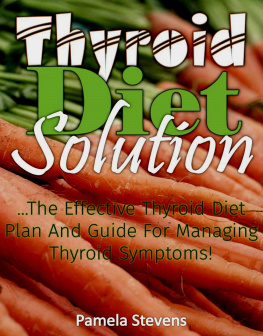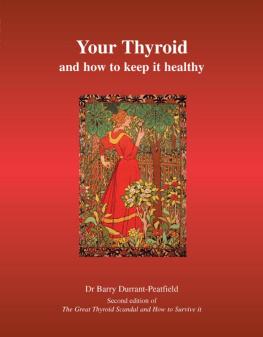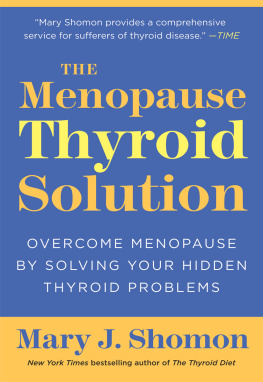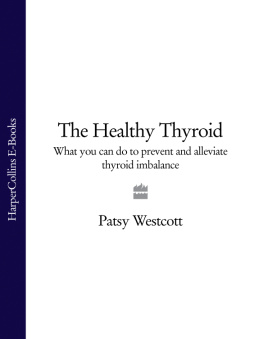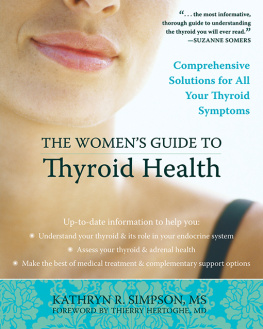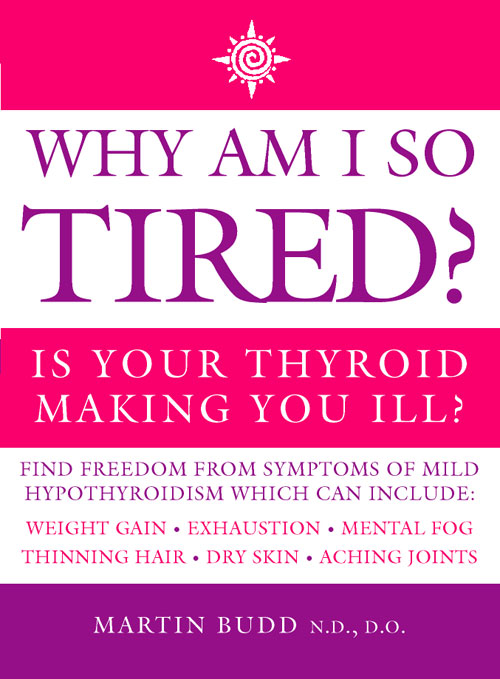Why am I so Tired?
Is Your Thyroid Making you Ill?
MARTIN BUDD N.D., D.O.

Contents
While the author of this work has made every effort to ensure that the information contained in this book is as accurate and up to date as possible at the time of publication, medical and pharmaceutical knowledge is constantly changing and the application of it to particular circumstances depends on many factors. Therefore it is recommended that readers always consult a qualified health specialist for individual advice. This book should not be used as an alternative to seeking specialist advice, which should be sought before any action is taken. The authors and publishers cannot be held responsible for any errors and omissions that may be found in the text, or any actions that may be taken by a reader as a result of any reliance on the information contained in the text, which is taken entirely at the readers own risk.
My interest in low grade or mild hypothyroidism began in the early 1980s. Following the publication of my first book Low Blood Sugar (hypoglycaemia) in 1981, I was consulted by many exhausted, depressed patients who having read the book were convinced that they had discovered the mystery cause behind their symptoms. However, it soon became apparent to me as I became more familiar with the diagnosis of hypoglycaemia, that approximately one third of the patients did not suffer from low blood sugar, but their fatigue was caused by another illness undiagnosed mild hypothyroidism.
Hypothyroidism is often missed in patients suffering from fatigue because many of these people do not fit into the medical definition of hypothyroid; many hypothyroid patients show clear test results under the accepted medical blood tests or do not fit into the typical picture of an overweight, middle-aged hypothyroid sufferer. For example, many young hypothyroid patients are not overweight but underweight. Men and women of all ages can develop thyroid problems, and there are over 100 symptoms caused by thyroid deficiency. The overweight middle-aged female with exhaustion and alopecia may well be the archetypal patient but a typical thyroid syndrome does not exist. Each patient can present their own unique symptom picture. Every organ and system in the body can be disturbed when the thyroid is underactive, and a mild thyroid malfunction can give rise to 10-20 different symptoms in each patient. Symptoms as diverse as leg cramps, allergic rhinitis, constipation, period pains and poor memory have all been attributed to hypothyroidism.
Mild or early stage health problems often go undiagnosed as laboratory tests identify only major blood changes. This has led to a situation where many suffer symptoms of illness but not clinically bad enough for a blood test diagnosis to be made.
Blood tests are only a reliable guide to diagnosis when the procedures for testing and the interpretation of the results are standardized. For example, with the diagnosis of diabetes, the test procedures and the normal ranges for blood glucose are internationally recognized. The test results therefore provide a reliable guide to the diagnosis, the severity and the successful treatment of diabetes. Unfortunately, the same cannot be said when testing for thyroid disorders.
In Why am I so Tired? I discuss many of the symptoms, treatments and causes of this underdiagnosed health condition. In I compare and elucidate the different diagnostic methods and show you some simple diagnostic tests you can carry out easily at home. I discuss both medical and naturopathic treatment and illustrate how diet, exercise and lifestyle changes, can go a long way to relieving your symptoms. Lastly, I discuss many of the underlying causes of a thyroid disorder so you can not only treat your symptoms more effectively, but learn to understand how your body became fatigued. I also discuss some of the different causes and diagnostic techniques for fatigue itself, so that you may begin to treat fatigue even if you feel hypothyroidism may not be the underlying illness.
I hope that with the help of this book you can begin to fight your fatigue and recover your natural health, energy and vitality.
Fatigue and weariness can slowly take over your body. You may find it difficult to motivate yourself, to become excited or express enthusiasm; body and mind are slow and heavy. Some of you may be painfully aware of this change in energy level, others may have experienced tiredness for so long it seems natural and cannot remember a time they felt vital or energetic if ever.
However, with the guidance of this book you can return to health. Here is the success story of one woman I helped through fatigue, stress and depression to finally recognize and treat her undiagnosed mild hypothyroidism.
Lizs Story
Liz had felt exhausted for four years. Prior to her total hysterectomy four and a half years ago, she had been a slim, active mother in her early forties with two teenage children and the happy wife of a successful caring husband.
She had hoped that after her hysterectomy she would enjoy a future without the monthly burden of heavy, painful periods caused by endometriosis. However, after three months convalescence, she felt certain that in her own words something was wrong. Within six months of the operation, Liz looked a different person. She was 20lb over her normal weight of 125lb, and her usual robust colour was replaced by an unhealthy pallor with dark shadows beneath her eyes. All of which made her look 10 years older than her 46 years. Although Liz was concerned about her looks, she was far more worried about how she felt.
The Tiredness
We all feel tired or fatigued now and again. Usually we can put it down to a few too many late nights, or maybe an unexpected stress or illness, maybe even just working too hard. This transient fatigue lifts after a few early nights or a restful holiday. Unfortunately the type of chronic fatigue you might be experiencing does not go away. You may constantly feel tired, your body may feel heavy all the time and simply concentrating on your work or completing the household chores may take all the energy you have. You like Liz may be suffering from a type of fatigue which cannot be solved by early nights or a holiday. Liz realized that her energy levels and work capacity compared very unfavourably with her pre-hysterectomy vitality; although, you may not be able to pin down your exhaustion to a single event or cause, you probably realize that you are not your normal, energetic, and happy self.
Liz ached with fatigue. Her neck, shoulders and lower back were stiff and painful. Her hands and feet were always cold and occasionally numb, and dull frontal headaches had become a daily pattern. Far from sleep refreshing her, she felt worse on waking and claimed that she didnt really surface until mid-day. The physical exhaustion was accompanied by mental exhaustion, this caused her to feel depressed. Her increasingly poor concentration and memory were the cause of many problems. Although she could remember her childhood with some clarity, her short-term memory was unreliable. She frequently lost her car keys and shopping lists, and missed appointments. On several occasions she could not recall where her car was parked and was obliged to take a taxi home.
The Domestic Stress


